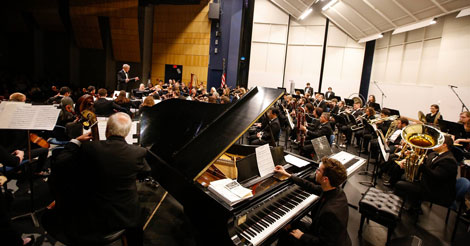Recent News
April 29, 2020Music to Explore with Dr. Paul Shewan

As music can provide comfort in difficult times such as these, I thought I would send you a list of pieces that are meaningful to me. It is my hope that, if you explore some of these pieces, they will be encouraging and uplifting to you. Feel free to dialogue and/or create your own list. Mine is by no means extensive. Enjoy! -Dr. Paul Shewan
Some of my recommended inspirational go-to pieces during the coronavirus pandemic (or any other time).
If you’ve never delved into the unique musical world of Anton Bruckner (1824-1896), now might be the time. He is mostly known for his symphonies, but also composed sacred chorale works and three Masses. A deeply religious man, he wrote every piece for the glory and praise of God. His music may often be heard in the context of a Gothic cathedral where large structures and spires symbolically reach up in praise to God. Bruckner was an accomplished organist and that also influenced his compositional style. His music is not to everyone’s liking, but there are many Bruckner fanatics out there. It takes time to listen to one of his symphonies, so don’t be in a hurry when listening. Let the music wash over you, and let it take you to another place! My favorite movements are the slow 2nd movements (sometimes the 3rd movement). They are profoundly deep on many levels. I hope you agree.
Here are some Bruckner pieces I recommend:
- Ecce sacerdos magnus (Roberts Wesleyan College Chorale, organ and three trombones, recorded in 1990) https://www.youtube.com/watch?v=a8DHp1dLHzo (something different and not orchestral)
- Symphonies 4, 5, 7, 8, and 9.
- Sym. 4. The Scherzo (mvt. 3) is great for the horns.
- Sym. 7. This might be the one to start with. Slow mvt. (2) is maybe my favorite.
- Sym. 8. Bruckner said it was his best symphony (it’s quite long, but worth it)
- Sym. 9. Unfinished. Ends appropriately with an Adagio that one writer called “a song of yearning at the end of which heaven’s gate opens.”
There are a lot of good recordings out there, but many believe Günter Wand conducting the Berlin Philharmonic are among the best.
Early on in my Classical music listening, I got hooked on the music of J. S. Bach. I highly recommend pretty much anything by Bach, but the Christmas Oratorio, Mass in B minor and his concerti are pieces you should check out. There are hundreds of Bach pieces that are worthy of mention, but any violin or piano (harpsichord) concerto, the Brandenburg Concerti, or the Concerto for Oboe and Violin (the slow movement especially!) are worth getting to know. The Cello Suites should also be included on this list. If you would like to try an interesting twist on Bach’s music, check out Stokowski’s unabashedly romantic orchestral transcriptions.
Some other inspirational pieces I recommend:
- Mozart, Mass in C Minor (his Requiem is almost as good).
- If you are up for opera, try Tosca by Puccini. (If you are really ambitious and have 17 hours to spare, watch the Ring Cycle {a set of four operas} by Richard Wagner. Watch this with sub-titles so you know what is going on!)
- Richard Strauss, Death and Transfiguration. If you don’t know his other tone poems, definitely try those too (Don Juan, Till Eulenspiegel, Ein Heldenleben, etc.)
- Brahms, Ein Deutches Requiem
- Prokofiev, Romeo and Juliet Complete Ballet
Of course, every Mahler and Beethoven Symphony (and concerto) should make this list, as well as the last three (or maybe six) Mozart symphonies, later Haydn Symphonies, symphonies by Schubert (8 and 9), Mendelssohn (3 and 4), Schumann (2 and 3), Brahms (all four), Tchaikovsky (4-6), Dvorak (7-9) and Sibelius (1, 2, and 5). I haven’t even mentioned any shorter works (e.g. overtures) or great pieces by Stravinsky, Rachmaninoff, Prokofiev, Debussy, Ravel, Bartok (Concerto for Orchestra), Britten, Shostakovich (syms. 5, 7, 15!), etc. I’m sure I’m forgetting some really great pieces, but this gives you hours of music to explore and hopefully some pieces and/or composers that are new to you. If you haven’t noticed, the pieces I’m recommending are orchestra-based; I’m not including chamber music or solo piano music which would overload this list.
For more news articles, you can take a look at our archive.